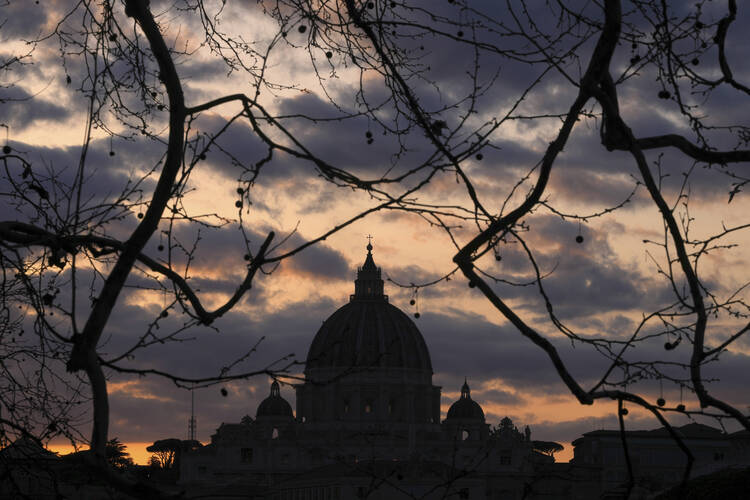Pope Francis continues to govern and lead the Catholic Church from his hospital bed in Rome’s Gemelli Hospital, where he has been for 18 days. Despite two health crises in the past two weeks—a respiratory crisis on Feb. 22 and a bronchial spasm on Feb. 28—the pope is in stable condition and is registering improvements as his doctors treat him for double pneumonia. The doctors still maintain a guarded prognosis, which means the pope is not yet out of danger. This morning, after another tranquil night, he had breakfast and continued his respiratory therapy.
Today, the Vatican released a strong message from Francis, dated Feb. 26 and signed in the hospital, to the participants in the general assembly of the Pontifical Academy for Life, who are meeting to focus on the theme: “The End of the World? Crises, Responsibilities, Hopes.”
Addressing the 150 academics from many countries, including war-torn Ukraine, and the academy’s president, Archbishop Vincenzo Paglia, 79, the pope warned that “it will not be technology that saves us” from the “polycrisis” that the world is now experiencing. Moreover, he said, “endorsing utilitarian deregulation and global neoliberalism means imposing the law of the strongest as the only rule; and it is a law that dehumanizes.”
He noted that the pontifical academy, which seeks to cultivate dialogue with the scientific world, is focusing on some fundamental aspects of this “polycrisis” in the field of life, health and care, but he said the issue is much broader.
Pope Francis said, “The term ‘polycrisis’ evokes the dramatic nature of the historical juncture we are currently witnessing, in which wars, climate changes, energy problems, epidemics, the migratory phenomenon and technological innovation converge.” He emphasized that “the intertwining of these critical issues, which currently touch on various dimensions of life, lead us to ask ourselves about the destiny of the world and our understanding of it.”
As a first step to answering this, Francis said, we must examine our actions “with greater attention to our representation of the world and the cosmos.” He warned: “If we do not do this, and we do not seriously analyze our profound resistance to change, both as people and as a society, we will continue to do what we have always done with other crises, even very recent ones,” including the Covid-19 pandemic. In that crisis, he said, we could have “worked more deeply in the transformation of consciences and social practices,” but we “wasted” the opportunity.
A second important step, he said, “is to listen carefully to the contribution of areas of scientific knowledge” in order “to avoid remaining immobile, anchored in our certainties, habits and fears.” He insisted that “listening is decisive,” and recalled that it was “one of the key words of the entire synodal process,” which is now in the implementation phase. He applauded the academy for taking up this synodal way of proceeding in its work.
“In the encounter with people and their stories, and in listening to scientific knowledge, we realize that our parameters regarding anthropology and culture require profound revision,” the pope reminded the academics. He said this realization at the Synod on Synodality led to the establishment of study groups on some of the themes that had emerged, and noted that some academy members are involved in these groups.
Then, in a significant passage referencing the encyclical “Laudato Si’,” Pope Francis said:
Our way of understanding ‘continuous creation’ must be re-elaborated, in the knowledge that it will not be technology that saves us: endorsing utilitarian deregulation and global neoliberalism means imposing the law of the strongest as the only rule; and it is a law that dehumanizes.
As an example of listening to the sciences, he cited the research done by the famous French Jesuit priest and paleontologist, Pierre Teilhard de Chardin (1881-1955), “and his attempt—certainly partial and unfinished, but daring and inspiring—to enter seriously into dialogue with the sciences, practicing an exercise in trans-disciplinarity.” It was “a risky path,” the pope remarked, “which led him to wonder: ‘I ask whether it is necessary for someone to throw the stone into the pond—indeed, to end up being ‘killed’—to open the way.’” In this way, he said, Teilhard de Chardin “launched his insights that focused on the category of relationship and interdependence between all things, placing homo sapiens in close connection with the entire system of living things.”
“These ways of interpreting the world and its evolution, with the unprecedented forms of relatedness that correspond to it, can provide us with signs of hope, which we are seeking as pilgrims during this Jubilee year,” Francis said.
“Hope is the fundamental attitude that sustains us on the journey. It does not consist in waiting with resignation, but in reaching out with enthusiasm towards the real life, which leads far beyond the narrow individual perimeter,” he said.
He went on to note that the multilateral approach to resolving problems has been gravely weakened, even discarded in recent decades. “We must unfortunately note a progressive irrelevance of international bodies,” he said, “which are also undermined by short-sighted attitudes, concerned with protecting particular and national interests.”
Pope Francis repeated what he had said in his encyclical “Fratelli Tutti”: “[W]e must continue to commit ourselves with determination for ‘more effective world organizations, equipped with the power to provide for the global common good, the elimination of hunger and poverty, and the sure defence of fundamental human rights’” (No. 172). In this way, he said, “a multilateralism is promoted that does not depend on changing political circumstances or the interests of the few, and which has stable effectiveness.” He identified this as “an urgent task which regards the whole of humanity.”
He concluded by commending the academy’s work to the intercession of Mary, Seat of Wisdom and Mother of Hope, who helps us “make our way in confidence towards ‘a new heaven and a new earth’ (Rev 21:1).”








